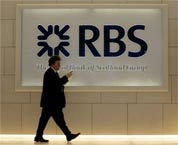Britain opts for fresh bank rescue amid historic losses
 London - The British government Monday launched a second multibillion-pound package to stabilize banks in an attempt to unlock credit markets, stem the rise of so-called toxic assets and ward off a deepening recession.
London - The British government Monday launched a second multibillion-pound package to stabilize banks in an attempt to unlock credit markets, stem the rise of so-called toxic assets and ward off a deepening recession.
The measures were announced as the Royal Bank of Scotland (RBS), Britain's third-largest bank, announced what would be the biggest loss in British corporate history.
The new government initiative comes as leading banks are expected over the next few weeks to unveil the true extent of so-called bad debt incurred through risky lending, estimated to total around 200 billion pounds (293 billion dollars).
Prime Minister Gordon Brown said he was confident that the new measures would kickstart lending by banks which had, among other factors, suffered from the "retrenchment of many overseas banks back to their home markets and the withdrawal of non-banking financial institutions from funding."
Centrepiece of the measures set out by Chancellor of the Exchequer Alistair Darling is a massive insurance scheme to protect banks from so-called toxic assets, a move it is hoped will encourage institutions to restart lending to businesses and households.
Under the scheme, banks will agree with the government the amount they expect to lose from particular debt, while the government will insure them for up to 90 per cent of their losses against a fee.
Brown, pressed by journalists to concede that last October's massive bail-out package had "failed," said: "Our action in October was to stop the collapse of banks. This is about the expansion of credit."
RBS revealed that it is expecting to write down assets by as much as 20 billion pounds, following a review of acquisitions including a share of Dutch bank ABN Amro, for which an RBS-led consortium paid 49 billion pounds in late 2007.
In addition, the bank's full-year 2008 losses could reach 8 billion pounds, bringing total losses to 28 billion pounds - the biggest in British corporate history.
RBS's loss would easily exceed the previous largest British corporate loss, telecoms firm Vodafone's 15-billion-pound negative in 2006.
As a result of the losses revealed by the Edinburgh-based bank Monday, the Treasury agreed to swap the 5 billion pounds of preference shares it holds in the bank for ordinary shares, thus increasing its stake in RBS from 58 per cent to nearly 70 per cent.
Shares in RBS on the London Stock Exchange fell Monday by more than 35 per cent to 22 pence, but later recovered.
Brown said he was "angry" at RBS for incurring such large losses due to taking "irresponsible risks" on the US subprime market and with the takeover of ABN Amro.
The government also announced a new Bank of England fund, worth up to 50 billion pounds, to buy high-quality government bonds in a bid to increase lending to companies with an annual turnover of more than 500,000 pounds.
It is the second bail-out for the banks in the space of just three months. A banking recapitalization programme of 37 billion pounds announced in October is widely seen as having failed to provide a sufficient platform for normal lending to resume.
Meanwhile, a new "superbank" - Lloyds Banking Group - started trading Monday with a pledge to cut costs by at least 1.5 billion pounds a year by 2011.
The new banking giant, created through an emergency merger between Lloyds TSB and HBOS, one of Britain's major mortgage lenders, will have a staff of 145,000 at 3,000 branches across Britain. (dpa)